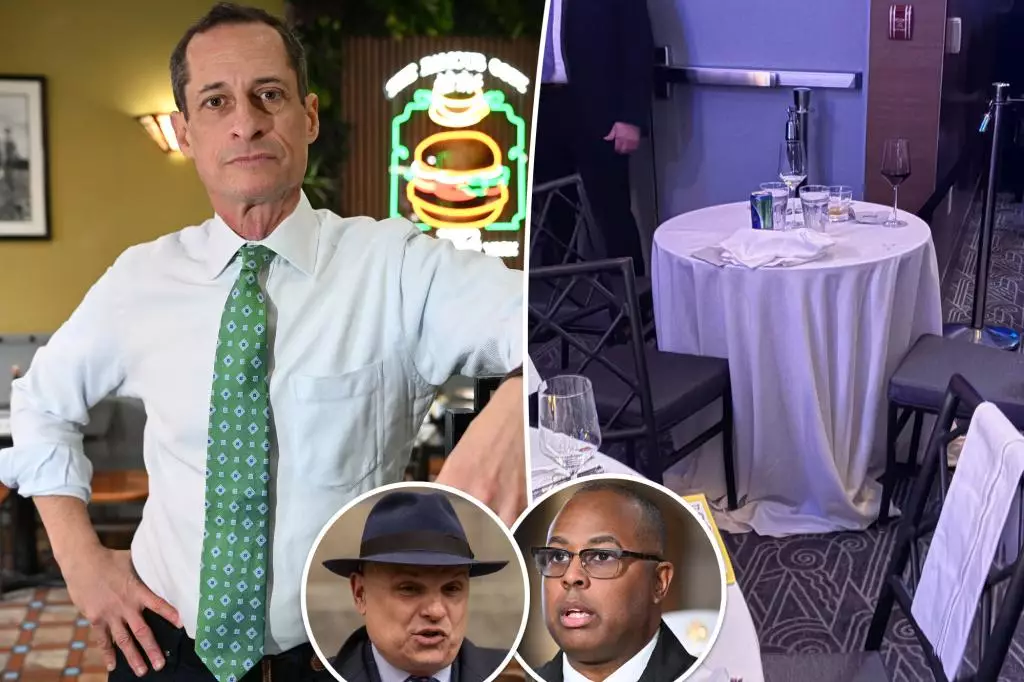The Inner Circle dinner has long served as a dazzling focal point of New York’s political elite, where celebrities and political leaders rub elbows at a night filled with satire and laughter. This annual gala is not simply a charity event; it’s a stage for both politicians and the media to connect, network, and, perhaps, indulge in a little self-deprecating humor. It’s precisely this atmosphere that makes Anthony Weiner’s recent experience at the 101st Inner Circle dinner so noteworthy.
By taking a closer look at the nuances of seating charts and the significance attributed to where one sits, we uncover a microcosm of power dynamics at play. In a room filled with power players, Weiner’s relegation to what insiders cruelly dubbed “the small Weiner table” speaks volumes about perceptions and reputations in the political realm.
Seating Struggles: A Symbol of Status
The incidents surrounding Weiner’s seating reveal much about the hidden rules of societal engagement within political circles. Initially seated at a large table, Weiner was unexpectedly moved to a smaller table meant for “kids,” presumably due to an oversight in the seat allocation. This rapid demotion speaks not only to his fall from grace but also serves as a stark reminder of the fickle nature of fame and acceptance in political spheres. In these environments, seating effectively becomes a barometer of an individual’s status among peers.
An insider who attended the gala noted that attendees chuckled at Weiner’s sudden shift, demonstrating how easily the tides of public opinion can swing. The laughter echoing around the room wasn’t merely jovial; it was a reflection of how our society delights in the unraveling of those who once held power. It’s an unsettling portrait of a man trying to make a comeback who finds himself literally and figuratively placed on the sidelines.
The Weiner Comeback: Resilience or Recklessness?
Despite the mockery surrounding him, Weiner continues to strive for relevance with a potential bid for a City Council seat. This ambition begs the question: is he displaying admirable resilience, or is he recklessly ignoring the ramifications of past transgressions? In his defense, Weiner claims that he left the gala to spend time with his son rather than flee in embarrassment, framing the situation as a priority for fatherhood over political presence. But is that a true reflection, or is it a conveniently crafted narrative?
The nuances of his response highlight a recurring theme in his life: the fine line between public persona and private turmoil. His attempts to reinvent himself must be met with skepticism, as the specter of his checkered history looms large in the minds of voters and peers alike.
Friendship and Allegiance: Aidala’s Support
Adding another layer to this narrative is the involvement of Arthur Aidala, Weiner’s long-time friend and defense attorney. Aidala’s staunch support stands in stark contrast to the ridicule Weiner faces, illustrating the complexities of political friendships. As he remarked, the seating mix-up was merely an honest mistake—a reflection of logistics that spiraled into public discourse, but even that casual dismissal reflects the underlying realities of power and connections.
Aidala’s loyalty also sheds light on the paths of redemption, as he emphasizes their enduring friendship through thick and thin. However, one must consider whether such relationships are sustainable when contrasted with the harsher judgments of the public eye. Can we truly separate Weiner’s affiliations and his ambition from the residues of his past actions?
Media and Political Interplay
The gala’s media presence brings forth another dimension to this discussion. Media vultures flapping at the fringes are eager to feast on the flaws and follies of public figures, and Weiner provides no shortage of content. Each mishap and misstep is scrutinized, often amplified to sensational levels. This relentless documentation creates a culture where mistakes are immortalized, and redemption seems a Herculean task.
In a world where a single mishap can become a headline, it’s evident that maintaining one’s reputation is a tightrope walk, especially for someone like Weiner. The media coverage surrounding the gala, particularly his seating ordeal, underscores the volatile intersection of fame, politics, and public perception.
Events like the Inner Circle dinner remind us of the intricacies of networking, the fragility of status, and the ever-watchful gaze of the media as it captures the unvarnished truths of our political landscape. In this turbulent atmosphere, every decision, every seating chart mishap, and every rapid exit paints a broader picture of the intricate dance between ambition and perception, paving the way for the question: Can one truly rise from the ashes of their past amidst such scrutiny and skepticism?


Leave a Reply